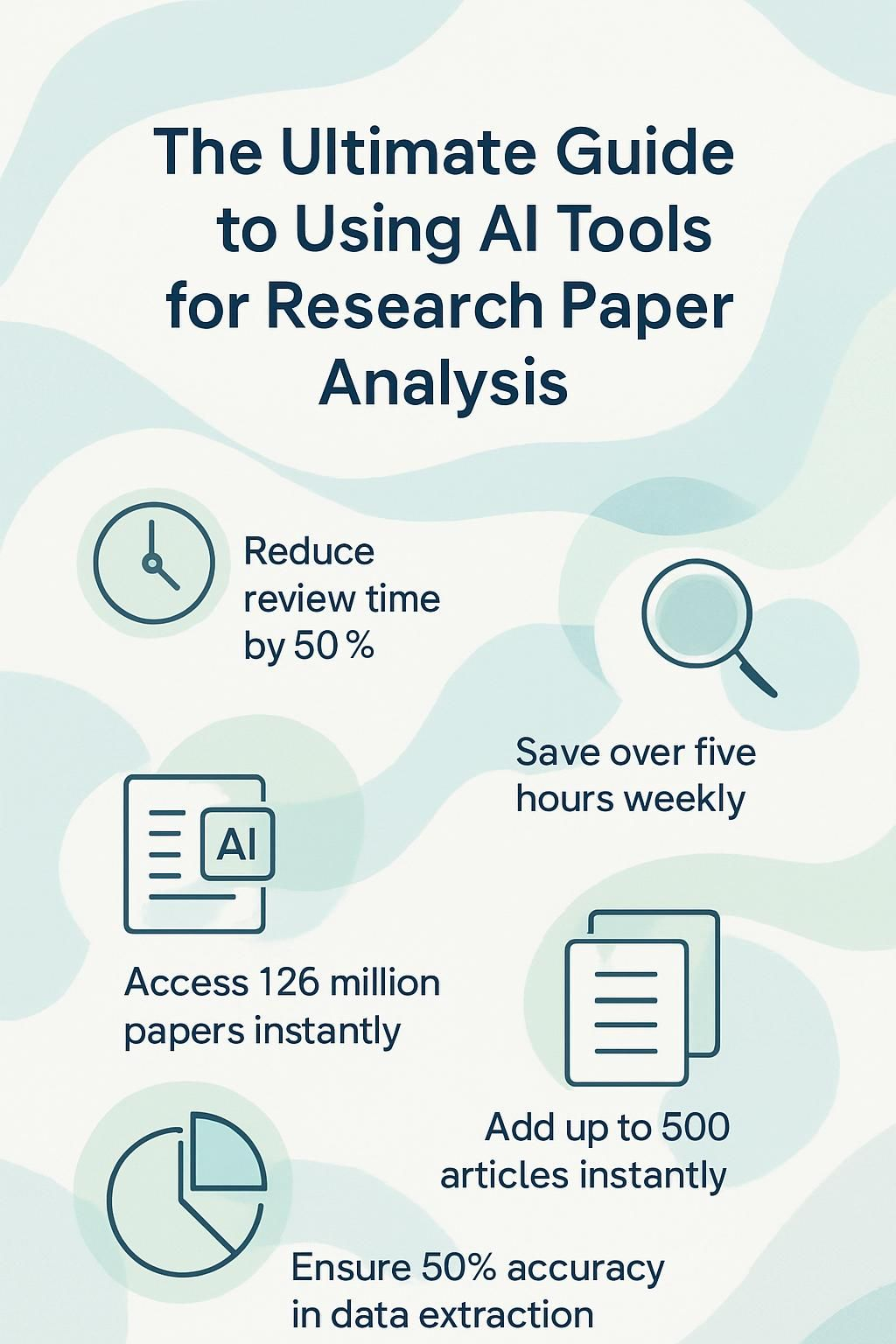Struggling to analyze research papers quickly and accurately? AI tools for research paper analysis can handle tasks like summarizing data and finding key studies in seconds. This guide will show you how these tools save time, improve accuracy, and make complex research easier.
Keep reading to find the perfect tool for your needs!
Key Takeaways
- AI tools like Elicit speed up research tasks by reducing review time by 80% and saving over five hours weekly.
- Tools ensure 90% accuracy in data extraction and link citations to original quotes for reliability.
- Features include automated data synthesis, transparent screening, citation tracking, and quick literature reviews.
- Elicit accesses over 125 million papers and adds up to 500 relevant articles instantly for analysis.
- The “Ask Paper” feature allows users to interact with full-text PDFs, extracting details without rereading content.

Key Features of AI Tools for Research Paper Analysis
AI tools handle complex research tasks with speed and precision. They simplify processes like source validation and data summarization.
Automated data extraction and synthesis
Elicit simplifies extracting and organizing data. It pulls information from countless research papers, including tables, in seconds. The platform automates rapid systematic reviews, saving hours of manual work.
Researchers can trace each step taken during report creation for transparency.
The tool generates editable reports using machine learning models. These reports provide synthesized data fast, making it ideal for literature review tasks or meta-analysis projects.
With features like these, Elicit helps researchers handle large datasets effortlessly while improving accuracy and efficiency.
Elicit’s automation ensures faster insights without losing precision.
Quick literature review and citation tracking
AI tools simplify literature reviews by identifying key research papers quickly. Tools like Elicit highlight important studies, allowing researchers to explore them easily. Users can add up to 500 relevant papers directly into their research collections in seconds.
This saves time and ensures access to critical sources.
Citation tracking gets easier with features that include direct quotes from original research. Such transparency helps verify facts and enhance credibility in systematic literature reviews.
Integration with platforms like Zotero also supports organized reference management for students and researchers alike.
Transparent screening and source verification
Elicit simplifies screening with one-click criteria for research papers. Researchers can trace and edit each step in the process, ensuring accuracy. This builds trust and reduces errors during analysis.
Source quotes back every AI-generated answer on Elicit, making it clear where information comes from. Detailed explanations improve transparency for students and researchers alike.
Up next—exploring how AI boosts efficiency in data extraction!
Benefits of Using AI for Research Paper Analysis
AI tools make research faster and smarter. They help you find patterns and key ideas with ease.
Improved efficiency and time savings
Elicit speeds up research tasks like systematic reviews. It reduces review time by 80%. This means more time for deeper work and analysis. Users save over five hours each week on average.
Tasks that once took days or weeks now take hours.
Manual data extraction costs drop by 50% with tools like Elicit. Automated processes make repetitive steps faster and easier. Literature reviews, meta-analyses, and citation tracking become less stressful and quicker to complete.
Students and researchers can focus on insights rather than tedious tasks.
Enhanced accuracy in data extraction
AI-powered tools ensure precise data extraction from research papers. For instance, Elicit delivers an impressive 90% accuracy rate. Its system links citations directly to original quotes, improving reliability.
This feature allows researchers to verify information without extra searches. It also explains AI-generated answers clearly, reducing guesswork.
Users can edit each step in the tool’s process and track changes easily. This transparency ensures that your findings align with your research needs. AI simplifies handling large datasets by sorting relevant details quickly and accurately.
Such efficiency leads into faster literature reviews and citation tracking processes ahead!
Deeper insights from large datasets
Large datasets provide unmatched opportunities for research. Tools like Elicit access over 125 million papers, helping users find key studies quickly. Researchers can instantly add up to 500 relevant articles to their analysis with ease.
This simplifies exploring new areas and understanding complex topics.
Machine learning models process data faster than humans. Large language models (LLMs) identify trends, patterns, and correlations hidden in massive amounts of information. Semantic Scholar also enhances this by highlighting valuable insights from academic content, offering a time-saving edge for students and researchers alike.
How to Select the Right AI Tool for Research
Choose an AI tool that fits your research style and works smoothly with your tasks—keep reading to find the best match!
Evaluate tool features for your specific needs
Choose an AI tool that aligns with your research focus. For instance, Elicit’s “Pro Plan” offers systematic review workflows and paper coding—useful for comprehensive data analysis.
The “Team Plan” includes live-editing features, ideal for group projects like theses or collaborative experiments.
Check the limits on data extraction in each pricing plan. Lower-tier options may suit basic tasks like citation tracking or literature reviews. If working with large datasets or placebo-controlled trials, higher-tier plans provide better functionality.
Match these features to your workflow and research methodology before deciding.
Consider compatibility with your research workflow
Check if the AI tool works with your current research process. Elicit, for example, integrates with Zotero to import sources directly. This makes it easy to collect and organize references.
It also allows exporting data into formats like RIS, CSV, or BIB for further use.
Some tools perform better in specific fields. Elicit is ideal for empirical studies in biomedicine and machine learning models. Make sure the tool supports tasks like citation tracking or transparent source verification based on your needs.
Always verify outputs since language models might have errors.
Exploring AI Tools for Efficient Research Paper Reading
Elicit makes research paper reading faster and smarter. It highlights key papers to answer questions like, “Can mindfulness help with sleep?” or “Does exercise improve cognition?”.
Its Pro Analysis feature quickly organizes insights, saving time for students and researchers. The Consensus Meter provides clear summaries across multiple studies.
The new “Ask Paper” (Beta) feature allows deep interaction with full-text PDFs. Users can upload a paper and ask detailed questions about its data, methodology, or findings. This helps extract information without rereading lengthy sections.
Elicit builds efficiency while improving understanding of complex topics in research papers.
Conclusion
AI tools are changing how we study research papers. They save time, boost accuracy, and make reviewing easier. Tools like Elicit help researchers find key insights faster than ever.
Choose the right AI tool to match your needs and simplify your work today!
For a comprehensive list of AI tools that can transform your research paper analysis process, check out our guide here.


Leave a Reply